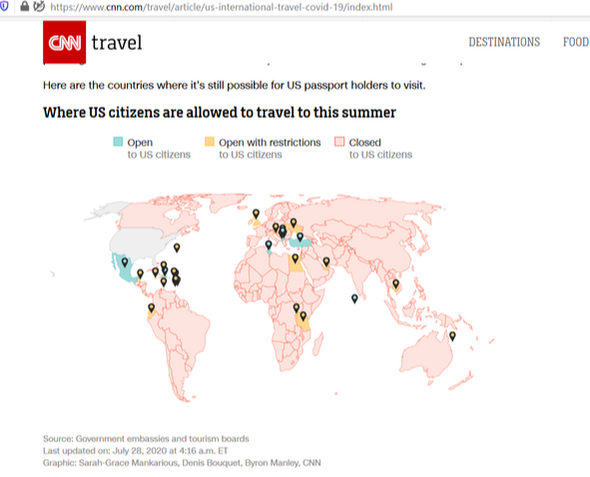I'm not much of an international traveler--I've been out of the country five times this century--but I have to admit these graphics have caught me up short. As an American, I'm accustomed to being part of a nation that puts a great deal of effort into deciding who may or may not enter my country, and on what terms (dubious as much of this effort may be). But as I preached way back in my first sermon at Christ, on Lazarus and the rich man's gate, you can't build a wall to keep others out without also locking yourself in. And because of our disastrous failure to contain the novel virus, that's exactly what has happened: we are, for the most part, stuck here.
This week we hear part of Paul the Apostle's famous depiction of humanity under the Law. In making his case that Jews and Gentiles, by different routes, are included in God's promises, Paul says that "God has imprisoned all in disobedience so that hey may be merciful to all." That word, which our version translates as "imprisoned," seems to have made translators and commentators squirm a bit. The King James scholars say "concluded," the New International Version says "bound over," the Revised Standard Version says "consigned." We have tended to hear it with two overriding concerns: am I really trapped in disobedience? And to what extent has God willed this imprisonment?
Here, as in most places, I prefer the more shocking and unpleasant translation. And the map above may explain why. Part of Paul's argument in his letters is that, Jew or Gentile, we tend not to know that we are imprisoned in disobedience. Day to day I just don't think about where I can go outside of the country. But faced with the grim reality--I am, in fact, more or less trapped here--it makes me think differently. Freedom can't come until we recognize that we are not already free.
Paul's harsh and stirring word here connects the Old Testament and the Gospel. Isaiah promises a time when God will gather not only his own people but others; and a Gentile woman pleads with Jesus to make this promise a reality for her. It is not that she is better or worse than the Jewish followers of Jesus. It is merely that she stands outside of the people to whom and through whom the Law and the Prophets speak. She is imprisoned in disobedience in her own way, as all the Gentiles are, but she makes the act of faith in pleading with the Messiah to heal her daughter all the same.
We live in a world full of unjust distinctions. Imprisonment is a powerful metaphor because we in America can be particularly cruel to the incarcerated on the grounds that they have somehow deserved that cruelty. Even prisoners approved for parole in Texas are being kept behind bars during a pandemic hitting those facilities especially hard. Humans tolerate cruelty like this because we can convince ourselves that the imprisoned are categorically different from us, deserving of a lower standard of dignity and humanity.
But Isaiah, Jesus, and Paul all remind us this week that our prison bars are just not visible to us. God saw fit to make confinement a universal human condition, so that all of us would need and call upon God's even-more-abundant mercy.


 RSS Feed
RSS Feed